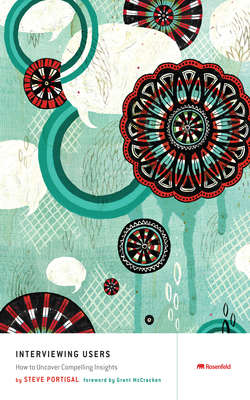Читать книгу Interviewing Users - Steve Portigal - Страница 23
На сайте Литреса книга снята с продажи.
Be Ready to Ask Questions for Which You Think You Know the Answer
ОглавлениеYou already know how you plan a balanced meal, prepare your taxes, or select an aspect ratio on your HDTV. You may already have an idea about how your participant does those things (because of what you’ve learned about them during the screening process, or implied by something they said earlier in the interview, or assumed by what you’ve seen other people do in the past). However, you need to be open to asking for details anyway. I’ll have more to say in subsequent chapters about asking questions, but for now keep in mind that to embrace their world you need to explore the details of their world. Some people fear that they are being false by asking a question if they think they know the answer. But don’t be so confident with your own presumptions. Interesting tidbits can emerge when you ask these questions, as this hypothetical example suggests:
Question: When are your taxes due?
The answer (which you already know): April 15
The response you fear: Why are you asking me this stuff? Everyone knows that it’s April 15. Get out of my house, jerk face!
The type of answer you are just as likely to get if you swallow your discomfort and ask the question anyway: I always complete everything by March 1. I think it’s April 15 this year, but I never really pay attention to that.
The goal here is to make it clear to the participant (and to yourself) that they are the expert and you are the novice. This definitely pays off. When I conduct research overseas, people tangibly extend themselves to answer my necessarily naïve questions. Although it’s most apparent in those extreme situations, it applies to all interviews. Respect for their expertise coupled with your own humility serves as a powerful invitation to the participant.
